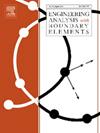用于解决均值场博弈的在线交互式物理信息对抗网络
IF 4.2
2区 工程技术
Q1 ENGINEERING, MULTIDISCIPLINARY
Engineering Analysis with Boundary Elements
Pub Date : 2024-10-25
DOI:10.1016/j.enganabound.2024.106002
引用次数: 0
摘要
我们提出了一种在线交互式物理信息对抗网络(IPIAN),从物理信息交互的角度解决均场博弈(MFGs)问题。在这项研究中,我们将代理之间的互动建模为物理信息交换过程,量化了个体策略选择的演变和分布。我们利用 MFGs 的变式二元结构将动态博弈问题转化为静态优化问题,然后利用对抗网络解决均场博弈。基于生成对抗框架,两个在线物理信息网络解决了值函数和密度函数问题。这些网络经过训练,可通过对抗手段近似求解均值场博弈。此外,还引入了自我关注机制,以加强对战略性物理信息的关注,从而提高 IPIAN 的表现力。数值实验验证了 IPIAN 在求解高维均场博弈模型方面的有效性,四旋翼飞行器在各种场景下的避障实验也证明了这一点。本文章由计算机程序翻译,如有差异,请以英文原文为准。
An online interactive physics-informed adversarial network for solving mean field games
We propose an online interactive physics-informed adversarial network (IPIAN) to address mean field games (MFGs) from the perspective of physics-informed interaction. In this study, we model the interaction between agents as a physics-informed exchange process, quantifying the evolution and distribution of individual strategy choices. We utilize the variational dyadic structure of MFGs to transform the dynamic game problem into a static optimization problem, subsequently employing the adversarial network to solve the mean field games. Based on the generative adversarial framework, two online physics-informed networks solve the value and density functions. These networks are trained to approximate the solution of MFGs through adversarial means. Additionally, a self-attention mechanism is introduced to enhance the focus on strategic physics-informed, thereby improving the expressiveness of IPIAN. Numerical experiments validate the effectiveness of IPIAN in solving high-dimensional mean field game models, as demonstrated by obstacle avoidance experiments with a quadrotor in various scenarios.
求助全文
通过发布文献求助,成功后即可免费获取论文全文。
去求助
来源期刊

Engineering Analysis with Boundary Elements
工程技术-工程:综合
CiteScore
5.50
自引率
18.20%
发文量
368
审稿时长
56 days
期刊介绍:
This journal is specifically dedicated to the dissemination of the latest developments of new engineering analysis techniques using boundary elements and other mesh reduction methods.
Boundary element (BEM) and mesh reduction methods (MRM) are very active areas of research with the techniques being applied to solve increasingly complex problems. The journal stresses the importance of these applications as well as their computational aspects, reliability and robustness.
The main criteria for publication will be the originality of the work being reported, its potential usefulness and applications of the methods to new fields.
In addition to regular issues, the journal publishes a series of special issues dealing with specific areas of current research.
The journal has, for many years, provided a channel of communication between academics and industrial researchers working in mesh reduction methods
Fields Covered:
• Boundary Element Methods (BEM)
• Mesh Reduction Methods (MRM)
• Meshless Methods
• Integral Equations
• Applications of BEM/MRM in Engineering
• Numerical Methods related to BEM/MRM
• Computational Techniques
• Combination of Different Methods
• Advanced Formulations.
 求助内容:
求助内容: 应助结果提醒方式:
应助结果提醒方式:


